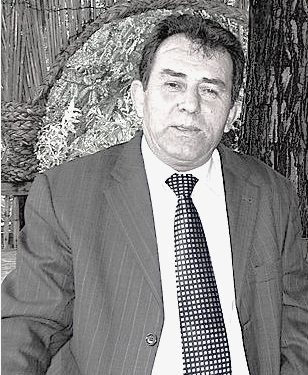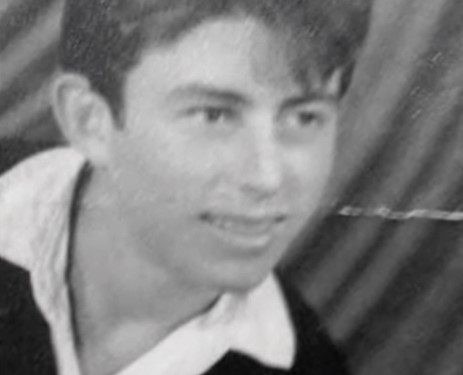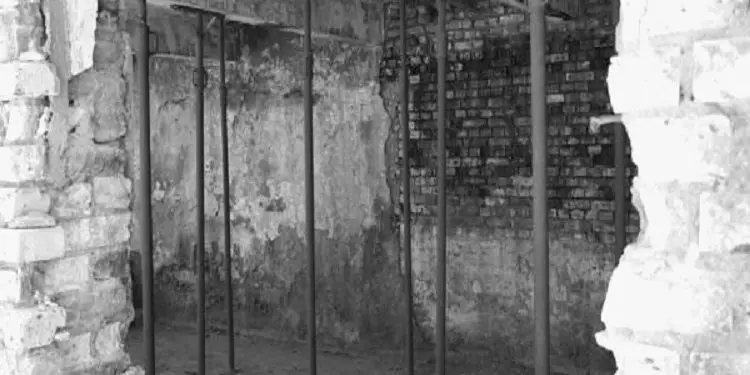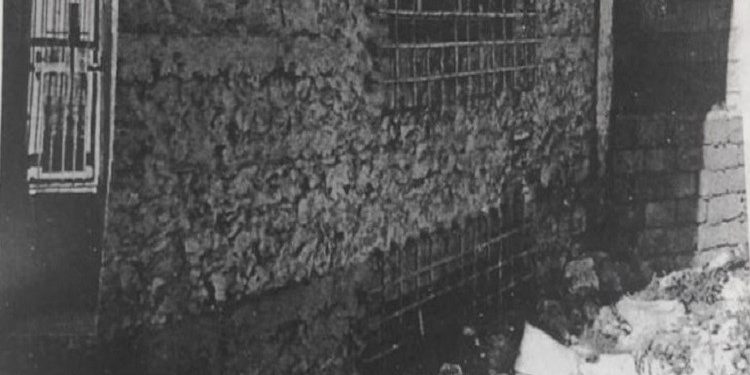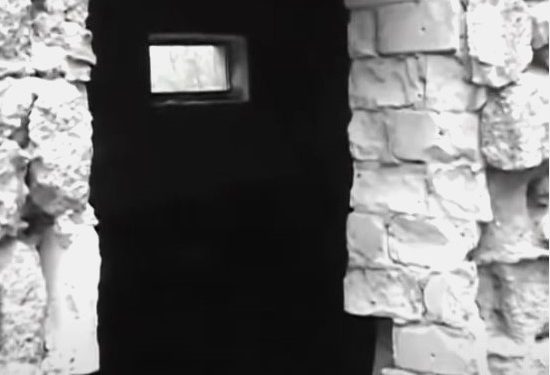By Shkëlqim Abazi
Part thirty-eight
Memorie.al / I were born on 12. 23. 1951, in the black month, of the time of mourning, under the blackest communist regime. On September 23, 1968, the sadistic chief investigator, Llambi Gegeni, the ruthless investigator Shyqyri Çoku, and the cruel prosecutor, Thoma Tutulani, brutalized me at the Branch of Internal Affairs in Shkodër, they split my head, blinded one eye, deafened one ear, after breaking several ribs, half of my molar teeth, and the thumb of my left hand. On October 23, 1968, they took me to court, where the pitiful Faik Minarolli gave me a ten-year political prison sentence. After half of the sentence was cut, because I was still a minor, sixteen years old, on November 23, 1968, they sent me to the political camp of Reps, and from there, on September 23, 1970, to the Spaçi camp, where on May 23, 1973, during the revolt of the political prisoners, four martyrs were condemned to death and executed by firing squad: Pal Zefi, Skënder Daja, Hajri Pashaj, and Dervish Bejko.
On June 23, 2013, the Democratic Party lost the elections, a process more than normal in the democracy we aspire to. But on October 23, 2013, the General Director of the “Renaissance” government sent Order No. 2203, dated 10.23.2013, for the release from duty of a police officer. Thus, Divine Providence was interwoven with the Neo-communist “Renaissance” Providence and, precisely on the 23rd; I was replaced by, no less and no more, but the former Security operative of the Burrel Prison. What could be more significant than that?! The former political prisoner is replaced by the former persecutor!
The Author
SHKËLQIM ABAZI
R E P S I
(Forced Labor Camp)
Memoirs
The Inmates: A Microcosm of Society
I met people of all categories there: brilliant professionals, excellent intellectuals, academics from all fields – doctors, linguists, engineers, agronomists, musicians, journalists, artists, poets, writers, athletes, painters – in a word, enlightened minds trained in the most prestigious schools of the West and East, whose theoretical and scientific preparation would honor even the most prestigious academies of the world’s most developed countries. I met honest and simple individuals; city workers or uneducated peasants and shepherds who didn’t know why they were in prison and didn’t even understand what politics was.
I met highlanders who ended up as “enemies of the people and the party,” simply because, following the tradition and code of honor (besa) of the mountains, they had given bread and shelter to all who asked for it, without distinguishing between communists and anti-communists; I met minorities from all groups: Greeks, Shules, Gorans, and Vrakachors, who, although they didn’t know a single word of Albanian and had never been down to the cities, except when the “sixty-nine” police wagon took them away with handcuffs, were baptized as politicians; I met Vlachs who only knew how to talk about sheep and life in the sheepfolds; I met foreigners -Germans, Italians, White Russians, Serbs, Montenegrins, Bulgarians, Greeks, and even Americans and one Australian – who came to Albania as political refugees or tourists and were given shelter in the cell-hotels of political prisons, as agents of the spy agencies of the countries they came from.
I won’t mention the several hundred Kosovars who came to the motherland after the reprisals and war by Tito’s regime, because I won’t include them with the foreigners, although communism considered them as such. They sought salvation from their blood brothers, and these brothers rewarded their trust by deporting the overwhelming majority to internal exile in the swamps of Myzeqe, others to political prisons, and those who remained were used as a currency of exchange in bargaining with the U.D.B. authorities. I won’t talk about the Chams because they were considered the same as the rest of us, if not worse. I won’t mention the exponents and intellectuals, representatives of the religious communities, because these were declared heretics and, as such, were fought and physically eliminated as early as forty-four, eliminating them as presumed potential enemies against communism. I met dozens of Egyptians (Jevgj), but I considered them settled and classified them as an integral part of our people.
Meeting the Arixhi (Gypsy) Political Prisoner
The greatest surprise, the one that left me speechless and made me hold my breath, was the time I met the only authentic Gypsy, the political prisoner, Refat Hamiti, who served about twenty years. If someone else had tried to wave the card of Gypsy politicians, I would never have believed it; I would even have accused them of abusing anti-communism and trying by all means to slander the regime, even though it was already wallowing in the mud. However, when fate hit me right in the face and I spoke to Refat directly, I was convinced of the meanness that system was capable of, like a devouring plague that consumed and eliminated indiscriminately whoever crossed its path.
In the paranoid, mad rush of the class struggle, they sought and sought out imaginary enemies even among the most peaceful groups who lived their lives with their mobile tents (cërga), wandering by the rivers; they fabricated reactionaries and kulaks even among the nomadic Gypsies. Later, when Refat and I became friends, my curiosity pushed me to learn his concept of the illogical war against individuals representing special communities, and to glean an opinion from a direct member of this community. So, I conducted the following conversation, which I present in the form of an interview.
Me: – “Refat, where are you from?”
Refat: – “How should I know, poor me! No, no, in fact, I don’t know what to say!? When they arrested me, the investigator told me: ‘You are from Përmet!’ In court, the prosecutor told me: ‘You are from Elbasan!’ When I came to the camp, the commander told me: ‘You are from Tirana!’ Some professors here in prison have told me: ‘You are from India!’ Come on; figure that out, I beg you!”
Me: – “Where were you born and when?”
He: – “Where I was born?! Even my father doesn’t know where I was born! But, surely in some willow grove, by the river! As for the date, they have changed it about ten times in every file. How should I know, poor me!”
Me: – “Are you married and do you have children?”
He: – “Married, you say!? Of course, about four times! I have three wives here, one in Greece! As for children, I can’t say exactly, but I think they must be over sixteen! Because if I made four with each wife, that’s how many it adds up to. The exact number, I swear to you, I don’t know!”
Me: – “Where do your wives and children live?”
He: – “How should I, a poor wretch in prison, know where my wives and children are! But, they certainly live in tents, by some river. Only God knows!”
Me: – “Refat, does anyone visit you?”
Refat: – “Well, as long as my father was alive, he came every month! Wherever he was, hop on a horse and he was here! When he died, my old mother came, also on horseback. After she died, one of the wives comes rarely, when their path leads this way.”
Me: – “Refat, why you were sentenced?”
Refat: – “The first time, as a saboteur and agent of the Greek Asfalia (security service), I was sentenced to twelve years.”
Me: – “Why, you have a second time? How did that happen?”
He: – “Well, what happened, you hear?! Nothing, nothing happened! You know, we Gypsies wander everywhere. We deal with horses, donkeys, and mules, the Gypsy women deal with baskets and sieves, today here and tomorrow there, we end up where we least expected it. We live with these things, my dear, that’s how God created us! But I told you, I had four wives? Yes. Well, I had to go and meet the one who lived in Greece too; I left along the rivers and streams, stayed two or three weeks there, left her pregnant, and came back the way I had gone. And here too, once with one, once with another, and then with the next, because they all had to be maintained. That’s how I lived my life, my dear, from tent to tent! I was content with this kind of life. We Gypsies are happy with little, my dear! A little bread, a little meat, a little raki, and fun, oh fun! All night with songs and celebration, and yes, lying with the Gypsy women and getting them pregnant, giving birth to two or three kids, year after year. That’s how we have maintained our lineage, my dear, because that’s how long a Gypsy’s life lasts: twelve years old, a groom; twenty, a man; forty, old; and fifty, in the grave! Do you understand now why we marry many times? Because our wives are left widowed at fifteen, with two or three kids to care for; in their thirties, they are grandmothers, and you don’t even feel like spitting on them.”
“So, my dear, I crossed the border, going in and out and out and in, it went well for me! But one of my people spied on me out of spite, and I got caught in the net as an enemy of the people. But of the Gypsy people, not of the others! You yourself experienced the stick in the investigation, so I don’t have to talk about that. So, stick and beating, and questions; not where you entered and not where you left, not whom you met and not whom you didn’t meet, and in the end, twelve years in prison.”
Me: – “And the second time, how that happened?”
He: – “Is that a question, you hear?! Well, how else would it happen? Like with all the others, who they let out for a year and then shove back in!”
Me: – “No, I asked because you are, so to speak, a traveler!” – I wanted to soften the term Arixhi (Gypsy), but he was quite smart; he caught my hesitation and quickly took the words out of my mouth.
He: – “Hey, just say it straight; you are a Gypsy without an address! You’re right, my dear, but what do these people care about the address of a Gypsy, a sojourner, a Gabel, a Romani, or whatever the hell else they call us. That’s what I thought too when they released me, after ten years in prison; I said, I’m a Gypsy, I’ll go from river to river and tent to tent and lose my tracks. But no, I was wrong, may the Fati take it! You can’t escape them once they put you in the vise! And who, me? No, my soul, no, I was the only Gypsy politician! Oh son, Enver didn’t leave anyone untouched, only our race had escaped! He wanted to herd the Gypsies too, because he had put the nose-ring on the rest of you a long time ago, just like we do with bears. Where would they find a better target than me, I was famous among the Gypsies! To have spent ten years in prison with educated politicians, according to them I should be knowledgeable and wise! Then, in every matter, I took the corner, because as the eldest, I had replaced my father as the head of the tribe! By striking me, they made all the Gypsies shut up.”
“Our lineage, we are not as brave as you think; we are pleasure-seekers, smart, but notoriously lazy! We don’t like physical labor, so we wander here and there to secure a living without effort. Dealing with donkeys, horses, and mules, making sieves, baskets, and hampers, playing the tambourine, drum, and zurna, making the bears dance, dancing ourselves, sometimes even committing a small theft; that’s our life, my dear! But it didn’t please Enver Hoxha that we were a flock left outside the collar and a negative example for the lazy. So, to scare the Gypsies into settling down and not wandering further, they needed a sacrifice. They found me, arrested me a second time on the charge of agitation and propaganda. Then, they gathered the Gypsies from wherever they were, held an exemplary trial for me, gave me another ten-year sentence, and here I am, as the representative of the community from which they snatched the most sacred thing it fanatically preserved, the freedom to move along rivers and streams, without harming anyone!” – He concluded his long speech.
A New Chapter: The School
I returned to the barracks with the coat over my shoulders and climbed the wooden stairs. Uncle Sherefi moved to make room for me. – “You’ve put on a coat, you lad, who gave it to you?” I told him about the inheritance Emini had left me, and about meeting the Gypsy and Ethem. – “Emini knew who to leave it to! And Refat, he’s a gold Gypsy, he’s a professor in his own way! Ethem is a proper boy, worth having as a friend!” – He concluded the topic of the inheritance and new acquaintances. He blew on the boxwood staff he held and added: – “Now get ready because we have a visit with Dom Mark. He’s sick; he hasn’t been well since he came out of the dungeon!” I jumped, and from the shock, I hit my head on the fiber ceiling. “Oh, my head!” A lump rose on the right side. The whole morning I had been busy; the hours had flown by quickly, and I hadn’t thought about the Dom at all; moreover, I didn’t know anything about his illness.
– “Did you hurt yourself, lad?” – “Uncle Sheref, you should have told me this first!” – I scolded him – “I just remembered, Vaska informed me! Come on, lad, let’s go” and we headed toward the left barracks, where Dom Mark was staying. At the end of the first row, on a straw mattress, the Dom laid semi-stretched out. As soon as he saw me, he tried to get up, but he couldn’t. Two people beside him stopped him. – “Leave me, men, look, my friend has arrived! How are you, my son Çim?” – He tried to form a smile, but his pale lips trembled and didn’t obey; he looked much paler than in the dungeon. I held out my hand and sat at the foot of the bed: – “How have you been, Dom Mark?” – I asked. – “I haven’t been very well, my son!” – He replied with trembling lips.
– “Did you get pleurisy in the cell?” – “No, man, I’ve had pleurisy for a long time. But now I’m older, and my strength has left me!” – “Have you been examined?” – “Yes, Doctor Naim just left; he was here and gave him an injection!” – One of those present jumped in. – “Sit here, Sheref,” – Dom Mark gathered his stretched legs and freed a part of the bed. – “I need to talk to you!” Uncle Sherefi reluctantly squeezed into the small space created at the end of the bed. – “Stay strong, Dom Mark, it’ll pass now!” – “Yes, man, what can you do, it will pass! I called you to ask you to take care of the boy, by my word; he won’t get through the winter in the cell!” – “Indeed!” – Uncle Sherefi supported him. – “When I was in isolation, I thought long about finding a solution; now we must agree on it. I don’t know exactly what the rest of you think; I personally thought he should start his schooling.” – “That’s not a bad idea! – Uncle Sherefi supported him again.”
– “Well, I spoke with some of my friends, and we agreed to start as soon as possible,” – he could barely catch his breath; his chest rose and fell quickly, and a strong rasping sound could be heard. – “By Allah, you are right! Now he’s on the right track!” – “Yes, he must learn!” – Uncle Sherefi affirmed with his inseparable irony. The priest coughed, then after a short pause, he began: – “First, he will start with the Albanian language, with Hodo Sokoli, and with Hilmi Leka the philosopher. An hour ago they were here; I spoke with both of them myself. With Ilia Iljadhi, he will learn French; with Agim Musta, he will study history; and then for the others, we’ll see as we go. I also spoke with Father Zefi and Father Vaska, and they also support this idea. We found the books; he just needs to sit down and bring roots to his studies. Did you hear me, son?” – he turned to me.
Then he was silent, breathing heavily for a few minutes; the asthma seemed to torment him and give him spasms. I felt sorry for him, and so as not to let him exert himself further, I answered without delay: – “Thank you for your care; undoubtedly, I will start tomorrow! I will even try to be a regular and diligent student!” – I added these words to please him. – “Bravo, son, you relieved my worry! Now I need to calm down a bit!” – And he rested his bony head on the pillow and closed his eyes; his withered face had taken on the color of wax. We got up without a word, shook hands with the two people present, whom I didn’t manage to figure out if they were neighbors or serving the Dom; nevertheless, I thanked them for their devotion in being there for the priest. Now, besides all the other troubles, I put the burden of school on my head. – “Come on, you blockhead, quickly to your bed, get ready for school!” – Uncle Sherefi teased me as we went out the door, and added: – “We have great work now!” – I didn’t know if he was being ironic or serious. You couldn’t tell with that man!
We entered our barracks. On the bed, two strangers were chatting with Vaska. As I was climbing the wooden stairs, Vaska motioned for me to stop and sent me to make coffee for them. I went to the private kitchen; put an aluminum basin on the hearth, with a piece of wire twisted as a handle. I added sugar and coffee, according to the measures the old men had taught me. Of course, it wasn’t real coffee, but a surrogate of coffee and roasted barley or wheat. I had often seen the old men digging chicory roots from the ground, and after drying them, they would roast them on the grill and grind them, to use them instead of coffee. So, real coffee was not found in prison, and even outside, it was difficult. Nevertheless, I boiled that mixture and, with the basin in hand, returned to the sleeping area. There, I handed it to Uncle Sherefi, who poured it into a couple of broken-handled cups and two aluminum glasses, the kind used as oil measures in grocery stores.
I sat in a corner. – “Cheers, thank goodness he came out healthy!” – The strangers wished me. – “Good luck with school!” – They turned to me. I was speechless; I didn’t understand what these people had to do with my school. Besides, had the news spread so quickly! “Ah, the prison radio, the prison radio!” I figured. Nevertheless, I returned the wishes with a “thank you” and waited to see what they would say. – “This is Ilia Iljadhi, and this other one, Namik Zeneli,” – Vaska introduced them to me. – “With Ilia, you will do French, while Namik is a living encyclopedia,” – he added. I noticed Namik, who held one hand tucked under his sleeve, as if paralyzed. Ilia had a bag on his lap; he opened it and took out some books, which he stacked on the mattress. – “To start with, these are enough! Here you have a French method book, a grammar, and Vedat’s dictionary; for a start, they are enough; later, we’ll figure out more!” – He accompanied each book he stacked with words.
It was the first time I held a French book. In school, I had studied Russian, but since communism with its idiotic Marxist-Leninist doctrine had brought us to our wits’ end, we were tired of Russian too; we equated that language with Lenin and Stalin and hated it just as much as them. In the years of prison and later, I had the chance to study Russian with excellent professors, brilliant students who had graduated with gold medals from the universities of Moscow and St. Petersburg, poets and prose writers, high-level journalists and translators, artists and filmmakers. The poets and translators Jorgo Bllaci and Pano Taçi, the literary figures and journalists; Robert Vullkani, Fadil Kokomani, Vangjel Lezho, Qani Çollaku, artists and filmmakers, such as; Lukë Kaçaj, Viktor Stratobërdha, and others, but as I said above, the hatred for communism had blinded us so much that we equated even the beautiful language of Tolstoy, Dostoevsky, Lermontov, Esenin, etc., with it.
So, I was pleased that they chose French for me. I opened the covers, glanced quickly at them; they were old, but well-maintained, full of notes along the pages. I immediately closed them and followed the conversations of the old men. They were simply discussing the topics of the day: health, the problems caused by the spies with their dirty wiretapping, daily troubles: insufficient food, lack of medicine for healthcare, the hardships our families endured to follow us, the difficulties they had to face to reach us, in the absence of means of transport, and other things of this nature. After about an hour, they got up to leave. As they descended the wooden stairs and walked down the corridor, I noticed Ilia, who were barely shuffling. He limped badly, leaning to the left with every step, while Namik, although he didn’t appear to limp, leaned to the right with every step.
These two men made a ridiculous pair! With every step, they almost bumped shoulders. As they took a step, Ilia’s head almost hit Namik’s shoulder, and the other’s head cast a shadow over his shoulder. But the picture became even more grotesque when you noticed the disproportionate bodies: Namik was tall and thin, Ilia short and a little stout. I could barely hold back my laughter, because I remembered a caricature similar to these two, with the caption: “Don Quixote and Sancho Panza, on a journey to fix the world.”
Of course, this drawing in the satirical magazine had nothing to do with the specific case, because it continued below: “…American imperialism and Soviet social-imperialism seek to deceive the people and subdue the world proletariat, but the glorious Leaders, the great teachers Comrade Mao Tse-Tung and Comrade Enver, have torn off and will continue to tear off the mask of the imperialist-revisionists and all their lackeys of every stripe, wherever they may be! Glory to triumphant Marxism-Leninism and victory to the proletariat!”
Even though I didn’t say it aloud, I named them in my mind: Namik, Don Quixote, as the taller one, and the other, Sancho Panza. With a few preparations for the next day, which I didn’t know what it would bring, this day also ended. In the morning, the wake-up call was at five, as always. The hustle and bustle began: bathroom, faucet, soup cauldron, changing for work, and rushing out to the path that led to the construction site. Like everyone else, I performed these mechanical movements, but when I went to line up, I didn’t know where to join: in the brigade of the “tekahytëve” (draftsmen/technical workers), or somewhere else?! No one had informed me. Nevertheless, I lined up with my former colleagues, but foreman Velko approached me and, to avoid others hearing, spoke softly into my ear: – “They didn’t give me your name; I’m sorry, I don’t know how you’ll be handled. But no problem, come with us until the construction site!”
Usually, when a prisoner was released from isolation, he returned to the brigade where he had been working, but in my case, it was about a somewhat privileged job, and I didn’t know what decisions the camp command, in cooperation with the technical office, might have made. So, I walked out with the others. But before we even reached the foot of “Golgotha,” a foreman was waiting, leaning against the pillar. – “Are you Shkëlqim Abazi?” – He addressed me, and without waiting for an answer, he added: – “You’ve been assigned to my brigade. Come, follow me!”
It was the foreman who had looked at me sternly the day I arrived at Reps. I immediately remembered his face. I didn’t speak, and I followed him. Without exchanging a single word, we took the uphill path, where work was being done to unload the earth, to expand the mineral deposit area. The crushing frantoja (crusher) rose from below toward the slope, to a height of twenty-nine meters, and on top, it was level with the terrace. This is where I had been assigned to work. Memorie.al




